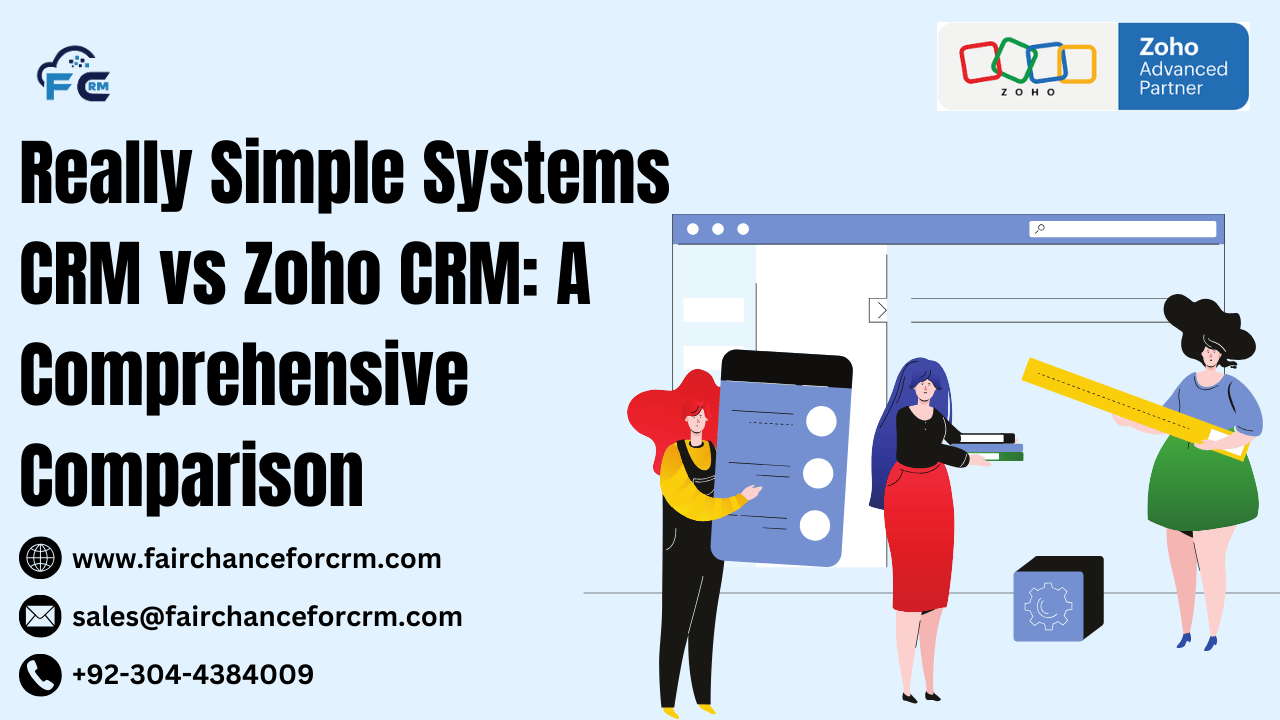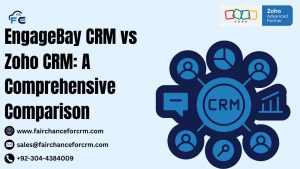Customer Relationship Management (CRM) software is essential for businesses looking to manage interactions with current and potential customers. In a world where data and customer relationships are central to success, choosing the right CRM platform is crucial. Two popular options in the CRM space are Really Simple Systems CRM Vs Zoho CRM. Both platforms are widely used by businesses of varying sizes, but they differ in features, ease of use, scalability, and pricing. This blog post will compare Really Simple Systems CRM and Zoho CRM to help you make an informed decision.
Also Read:
- Xero CRM vs Zoho CRM: A Comprehensive Comparison
- SharpSpring CRM vs Zoho CRM: A Complete Comparison Guide
- Pipeliner CRM vs Zoho CRM: A Complete Comparison
- Zendesk Sell CRM vs Zoho CRM: A Complete Comparison
- Keap (formerly Infusionsoft) CRM vs Zoho CRM: A Comprehensive Comparison
Really Simple Systems CRM vs Zoho CRM
1. Overview: What Are Really Simple Systems CRM and Zoho CRM?
Really Simple Systems CRM
Really Simple Systems CRM is a cloud-based CRM platform designed for small to medium-sized businesses. Its core focus is on simplicity and ease of use, making it an ideal choice for teams without a dedicated IT department. It offers features that help manage contacts, track sales leads, automate processes, and support customer service functions, all in one user-friendly interface.
Key Features:
- Contact management
- Sales pipeline management
- Task and calendar management
- Email marketing and automation
- Customer service support tools
- Mobile apps
- Reporting and analytics
Zoho CRM
Zoho CRM is one of the most popular and comprehensive CRM platforms available today. It is part of Zoho’s extensive suite of software solutions, which include tools for email, marketing, accounting, project management, and more. Zoho CRM offers advanced features that cater to businesses of all sizes, from small startups to large enterprises. The platform is known for its high customization potential, integration options, and scalability.
Key Features:
- Lead and contact management
- Sales automation
- Marketing automation
- Workflow automation
- Advanced analytics and reporting
- AI-powered insights (Zia)
- Integration with other Zoho apps and third-party tools
- Multi-channel communication (email, chat, social media)
- Mobile apps and dashboards
2. Ease of Use – Really Simple Systems CRM vs Zoho CRM
Really Simple Systems CRM
True to its name, Really Simple Systems CRM is incredibly user-friendly. The interface is clean, intuitive, and minimalistic. Even users with limited technical knowledge can quickly set up and start using the software. This simplicity, however, doesn’t mean a lack of powerful features—rather, it focuses on offering essential functionalities that a small or growing business would need, without overwhelming users.
Pros of Ease of Use:
- Easy setup and quick learning curve
- User-friendly interface
- Minimal configuration required
Cons of Ease of Use:
- Limited customization options compared to more advanced platforms
- Some advanced features are not as polished as in other CRMs
Zoho CRM
Zoho CRM offers more complexity, which comes with a steeper learning curve. While the platform is highly customizable and robust, it may require more time to understand all of its features and configure it according to your specific needs. However, Zoho provides extensive tutorials, support, and community resources to help new users get started.
Pros of Ease of Use:
- Highly customizable user interface
- Intuitive workflow automation setup
- Dedicated training and support resources
Cons of Ease of Use:
- Steeper learning curve for beginners
- Can become overwhelming for businesses with simple needs
3. Features and Functionality – Really Simple Systems CRM vs Zoho CRM
Really Simple Systems CRM
While Really Simple Systems CRM excels at simplicity, it still provides essential features needed for managing customer relationships. Some of the standout features include:
- Sales Pipeline Management: Track prospects, deals, and sales stages.
- Contact Management: Easily store and organize contact details, including emails, phone numbers, and meeting notes.
- Task Management: Organize and prioritize tasks, deadlines, and activities.
- Email Campaigns: Basic email marketing functionality allows businesses to send newsletters, promotional campaigns, and follow-ups.
- Customer Support: Includes support ticketing, knowledge base, and FAQ tools.
For businesses with simple needs, Really Simple Systems offers just the right amount of functionality without unnecessary complexity.
Zoho CRM
Zoho CRM offers a more feature-rich platform, with functionalities suited to businesses of all sizes, including advanced features for sales, marketing, and customer support teams. Key features include:
- Sales Automation: Automate repetitive tasks such as lead capturing, data entry, and follow-up reminders.
- Marketing Automation: Create sophisticated email campaigns, social media posts, and trigger-based actions.
- Advanced Analytics and Reporting: In-depth reporting tools to analyze sales performance, lead conversions, and marketing campaigns.
- AI-Powered Insights (Zia): Zoho’s AI assistant can predict sales trends, analyze customer data, and provide intelligent recommendations.
- Multi-Channel Communication: Integrate with email, social media, live chat, and telephony systems to communicate with customers on various channels.
- Customization and Integrations: Offers extensive customization, allowing you to create tailored workflows and integrate with third-party apps like Google Workspace, Microsoft 365, and more.
Zoho CRM provides an incredibly comprehensive set of features that can support both simple and complex CRM needs.
4. Customization and Integrations – Really Simple Systems CRM vs Zoho CRM
Really Simple Systems CRM
While Really Simple Systems offers a basic CRM solution, customization options are limited compared to Zoho CRM. You can customize fields, reports, and layouts to an extent, but you won’t have the level of control offered by more advanced CRM platforms. Integration capabilities are also limited to a few popular tools such as Google Calendar and Mailchimp.
Zoho CRM
Customization is one of Zoho CRM’s strongest points. You can tailor the platform to suit your business needs, including creating custom fields, workflows, automation rules, and reports. Zoho also offers deep integration capabilities with a wide range of third-party applications, making it a versatile solution for businesses that require a CRM system that integrates seamlessly with their existing software ecosystem.
5. Pricing – Really Simple Systems CRM vs Zoho CRM
Really Simple Systems CRM
Really Simple Systems CRM is relatively affordable, making it an attractive choice for small businesses and startups. The platform offers a free plan with basic features for up to 2 users, which is ideal for very small teams. Paid plans are reasonably priced, with the entry-level plan starting at around $15 per user per month, making it accessible for businesses with limited budgets.
Zoho CRM
Zoho CRM is also budget-friendly, but with a more complex pricing structure. It offers a free plan for up to 3 users, with limited features. Paid plans start at around $14 per user per month, with advanced plans priced higher, based on the range of features and customization options. While the initial cost is low, the complexity and scale of the platform may make it more expensive for businesses as they grow.
6. Customer Support – Really Simple Systems CRM vs Zoho CRM
Really Simple Systems CRM
Really Simple Systems offers great customer support, including live chat, email support, and an extensive knowledge base. They also provide personalized support, which is particularly useful for small businesses with fewer resources.
Zoho CRM
Zoho CRM provides excellent customer support as well, with 24/7 phone, chat, and email support for premium users. There is also an active community forum, extensive help documentation, and tutorials to assist with troubleshooting.
7. Which One Should You Choose?
The choice between Really Simple Systems CRM and Zoho CRM ultimately depends on your business’s needs:
- Choose Really Simple Systems CRM if:
- You are a small business or startup with simple CRM requirements.
- You want an easy-to-use, straightforward CRM solution.
- You have a limited budget and need basic features like contact management and task tracking.
- Choose Zoho CRM if:
- You need a highly customizable CRM platform with advanced features.
- You are a growing business or enterprise that needs scalability and integration with other tools.
- You have a dedicated team and require sophisticated sales and marketing automation features.
Conclusion
Both Really Simple Systems CRM vs Zoho CRM are solid CRM platforms, each with its own strengths and weaknesses. Really Simple Systems offers simplicity and ease of use, ideal for small businesses looking for basic CRM functionality. On the other hand, Zoho CRM is a robust, feature-rich platform that can scale with your business, providing advanced tools for sales, marketing, and analytics.
Ultimately, the right choice depends on your business size, budget, and specific CRM needs. If simplicity is your priority, Really Simple Systems is an excellent choice. But if you’re looking for a more feature-packed CRM that can grow with your business, Zoho CRM will provide the tools and flexibility you need.
For more information about the Really Simple Systems CRM vs Zoho CRM, visit this link.
If you want to Free Trail Zoho, click on this link.




